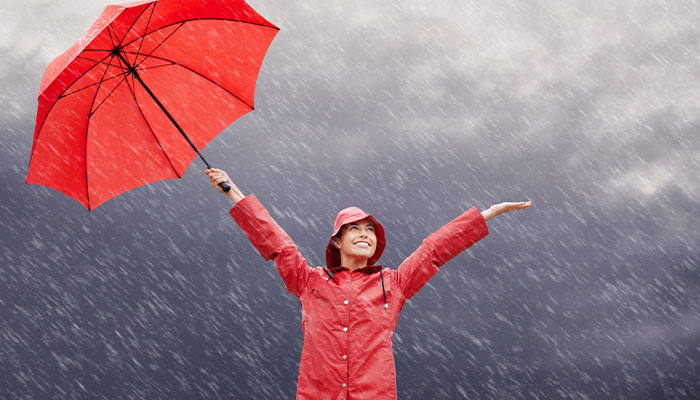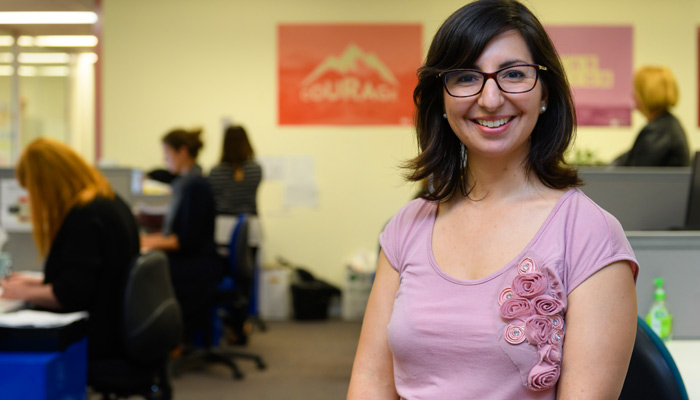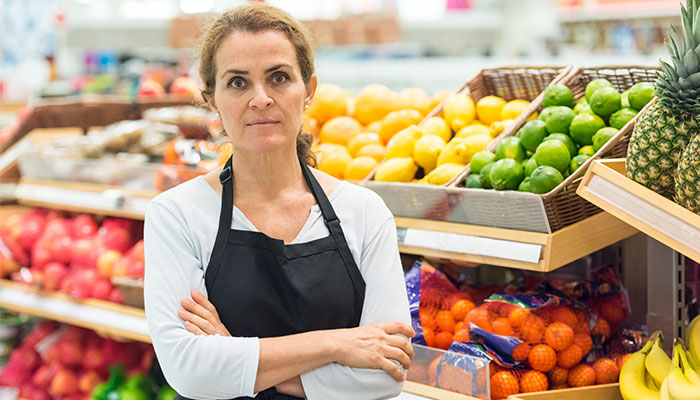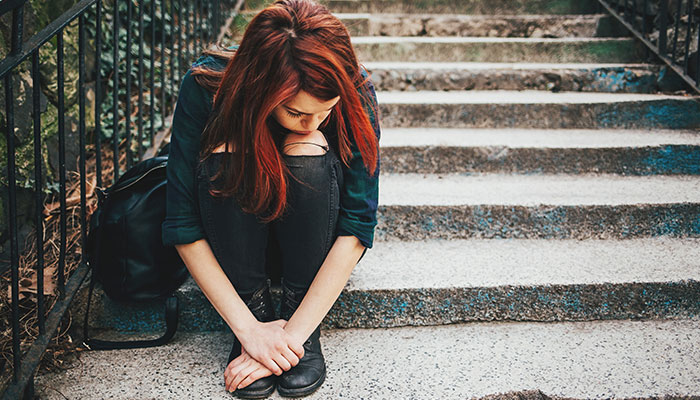People often talk about resilience as though it’s a disposition, or a trait. But there is broad agreement among researchers that resilience is an observable outcome in people who undergo a level of psychological risk and, instead of declining in their wellbeing and functioning to a level that impacts them in a clinically significant way, they might only have a small downturn before bouncing back to normal levels of psychological functioning. Or they may not experience any downturn at all, which is what is sometimes called robust resilience.

Weathering the storm: people generally can develop the capacities to bounce back from stressful events and situations.
Resilience, then, is an outcome, measured in the context of symptoms like those of anxiety or depression.
The risks that people undergo can be many different things – for example, a major traumatic event, such as a terror attack or bereavement, or major life changes such as adjustment to university, joining the military, or unemployment.
When people talk about resilience as a disposition, they are in fact referring to capacities or factors that make people more robust.
You can learn and develop these coping strategies, but sometimes you might need to practice them, or adapt them to your individual strengths.
When people say ‘I want to get more resilient’ what that means is they want to build these capacities for resilience. What is key about these capacities is that many of them are not stable and they can change.
So, you can learn resilience. In fact, people generally can develop the capacities to be resilient and like any skill, it is mostly learned.
In our work, we have categorised the capacities that are teachable, or amenable to change, in three main buckets.
Bucket one: coping strategies
The first bucket is your strategies for resilience. For example, you might be able to do certain things that help you cope with a stressor to increase your likelihood of a resilient outcome – techniques such as deep breathing, or thinking about situations differently, and engaging in activities that we find meaningful and consistent with our values (for example, helping others).
Again, you can learn and develop these coping strategies, but sometimes you might need to practice them, or adapt them to your individual strengths, or remember to use them when you are having a tough time.
Bucket two: coping resources
These are the resources we have that enable coping to take place. A support network of family and friends is an important one. So is money or time - in this way some resources are more easily gathered than others.

Reaching out: Having a support network of friends and family, and feeling you can trust other people, are good for resilience and coping.
Some previous research finds that in major traumas people who also lose income have a greater likelihood of post-traumatic stress disorder (PTSD). One reason for this is that money enables you to buy things that support coping, like paying people to come and cook your dinner, and for psychological or health services.
Money is a resource that may not be open to change, so you might need to focus on the ones that are. Energy is a good example here. People who have low energy or physical vigour may struggle more to engage coping, but you may be able to fix that: for example, if bad sleep is a cause, you can work on that with help from your GP; you can also improve your diet and exercise routine to increase your energy.
Bucket three: resilient beliefs
This category of resilient beliefs is the most difficult to change, because beliefs can form in your early childhood and continue to form in your adulthood, and they can be sticky and hard to adapt.
There are many, many of these beliefs, but the ones we normally teach people about are optimism, trust in others, and self-efficacy and hope.
If we don’t think we can trust other people, that might mean we don’t share our emotions, seek support, or allow others to get close to us.
Hope is comprised of beliefs about how much you believe you can change your circumstance and having a pathway to make that change.
If you face an uncertain situation and you judge it pessimistically – that is, you believe that things are unlikely to go well – then the likelihood is that your thoughts will be pessimistic and that will affect your feelings and behaviour.
On the other hand, if you walk around in the world and judge uncertain situations as ones from which you’ll likely get good outcomes – that is, optimistically – that also affects your emotions and behaviour but in ways that better help you adapt to situations.
- #EnvyFail: Have influencers lost their lustre during the COVID-19 era?
- VIDEO How cities can help save the trees
If we don’t think we can trust other people, that might mean we don’t share our emotions, seek support, or allow others to get close to us. It affects our behaviour towards them and how we feel about our interactions with them, and that can have negative effects on our resilience and coping.
We know that support networks are really good for resilience and if we don’t have access to those positive, close relationships, we may be less likely to have a resilient outcome during trying times.
How to tackle negative beliefs
One way we get people to change their beliefs is by testing them in the real world. For example, people might make predictions about what is going to happen, and then when it doesn’t, and something else happens, it becomes a basis for them to challenge their belief system. It is simple reality testing in a pseudo-experimental way.

Big picture: Dr Monique Crane (pictured) says resilience is not just about the person; it is also about the system in which they exist.
You can change these beliefs on your own, if you are aware of your beliefs and assumptions and how they play into your life, but for some people it is really tricky and they get stuck, and their beliefs only happen to be challenged in a therapeutic context – or sometimes by a crisis.
Ironically, it is through crisis events that people will realise that others do support them and can be trusted and they consequently change their perspective on the world. Similarly with self-efficacy, people might walk around thinking ‘I can’t change my situation’ and then something happens and they do change it. As a result, they might also change their belief about how much agency they have.
We are not alone
Resilience outcomes are not just about you as a person, it is also about the system in which you exist. A person can bring lots of capacities and capabilities for resilience to the table, but if the system – whether it is a workplace, institution or a society – does not support you or limits your access to important resources, resilience as an outcome becomes less and less likely.
- Can you really make friends with an octopus?
- World-first software could revolutionise how we understand disease
The stresses people are undergoing right now due to COVID-19 are extremely trying for people. When you have an overarching stressor like COVID-19, if the formal and social systems do not provide necessary resources – if friends and family fail to provide positive support, if you can’t get health care, a secure place to live, or job or wage protection – then the impact of the stressor is likely to increase.
So, we need to acknowledge how the social context or system may also play a role in the likelihood of being resilient.
Dr Monique Crane is a Senior Lecturer in Macquarie’s Department of Psychology. She is the author of Managing for Resilience: A Practical Guide for Employee Wellbeing and Organizational Performance.



